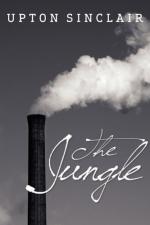|
|
The Jungle Topic Tracking: Muckraking
Upton Sinclair spent time working in the Chicago slaughterhouses, working on journalistic articles. The Jungle, even though it is fiction, is considered one of the greatest works of muckraking journalism.
Chapter 3
Muckraking 1: Sinclair writes that the government inspector, who was to inspect the cattle for disease and injury, was easily distracted and any number of sick, diseased cattle could be slaughtered and processed for consumption by humans. Sinclair indicates that beef bosses distracted the inspector on purpose.
Chapter 5
Muckraking 2: Antanas, who works in the pickling rooms at Durham's, tells stories of waste products and refuse being thrown into vats of beef and processed for human consumption. These are charges that turn the nation's stomach when they read The Jungle.
Muckraking 3: Jurgis watches as pregnant cows, classified by the government as not fit for food, are sneaked past the government inspector and slaughtered for meat. Even more horrible, Jurgis sees the fetus sliced out of the dead cow and processed as meat as well. Charges like this spurred the US government to enact pure food laws.
Chapter 8
Muckraking 4: The factories slow down during certain times of the year, or close down altogether, leaving families to starve. When work hours decrease, workers are still expected to show up for a full day, but are only paid for the hours when work is available. It is an illegal labor practice, but the workers are helpless. This novel helped to shed light on the plight of the laborer.
Chapter 9
Muckraking 5: Jurgis is paid for his vote in an election, and bribed with beer. His co-workers explain the system of graft to him: how his bosses force workers to hand over some of their pay in order for the workers to keep their jobs.
Muckraking 6: Jurgis learns how tubercular steer and hogs are processed for meat. He also learns the "recipes" of Durham's "pure leaf lard": the waste products of the cow, including tongue, heart, and intestines. This is then dyed with chemicals and sold as pure lard. Jurgis also learns that horsemeat was used in Durham's but had temporarily been suspended due to an investigation. Again, this scene was an impetus for the passage of the Meat Inspection Act of 1906.
Chapter 14
Muckraking 7: Elzbieta sees how the sausage is doctored when she works filling casings in the sausage room. She sees how any random mix of animal parts is ground into "sausage." Anything that is spoiled is simply dyed with chemicals like borax and packaged for sale. In addition, she watches as leftovers that have fallen on the floor of the room are scooped up, along with dead rats and other filth, and put into the grinding machine for sausage. Another impetus toward passage of the Pure Food and Drug Act of 1906.
Chapter 23
Muckraking 8: Jurgis gets a job digging conduit tunnels for illegal telephone lines under city streets. The author says Jurgis doesn't know that the project he is working on is an elaborate, illegal plan to connect all the Chicago merchants and major industries and help them crush the workers' unions-the Teamsters. When these conduits are built, this bloc will have the Teamsters "by the throat." If anyone questions the practice, he is paid off and kept quiet. As soon as the conduits are built, the papers investigate and a scandal erupts.
Chapter 25
Muckraking 9: Jack Duane introduces Jurgis to the boss of the Racing Trust-an underground, corrupt organization that fixes races by disabling horses, drugging them, and bribing members of state legislatures.
Chapter 25
Muckraking 10: Jurgis helps Mike Scully fix an election by bribing workers with beer and by buying their votes. Scully hopes that if he fixes the election for a Republican candidate, then he will secure a no-contest election next year in which he will run unopposed. Sinclair exposes the corruption of city politics, which exploited the poor workers of the yards.




